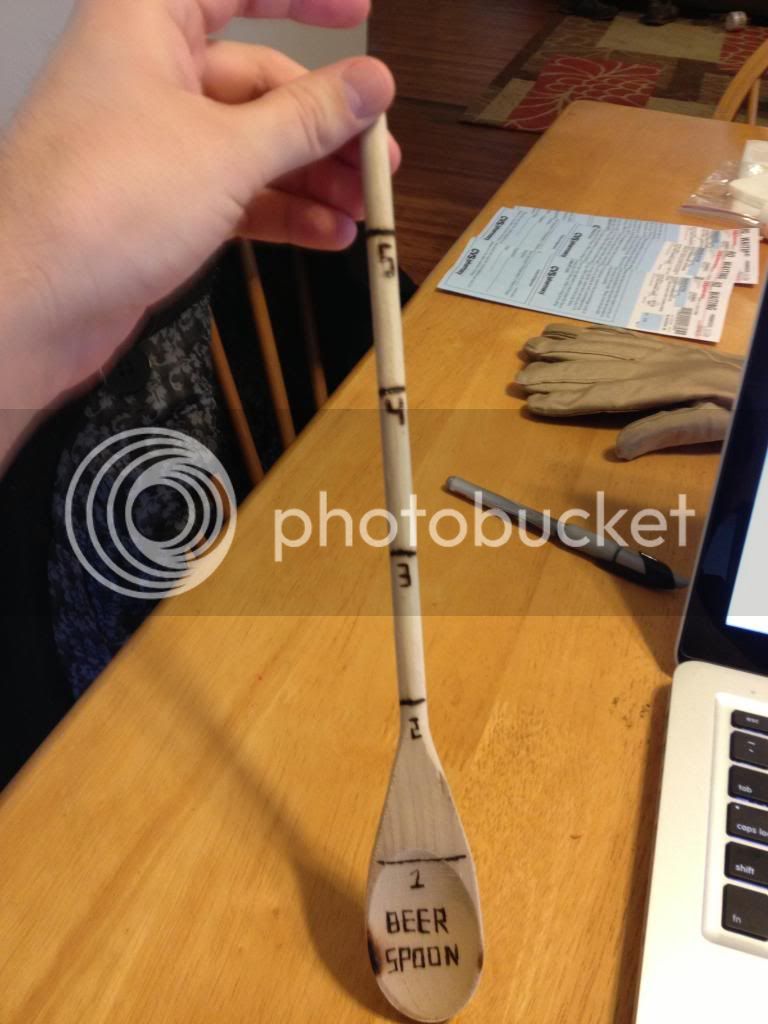Yesterday I did my first BIAB, although I definitely had some issues, I am HOOKED.
I did full volume no sparge. ( I think)
Recipe:
7 lb 2 row
2 lb munich(light) 10L
1.75lb crystal 40L
.75 lb Carapils
.5 lb euro carvienne
1.25 oz cascade @60
1 oz cascade @ 10
1.75 oz cascade @0
My wife was cool enough to stitch me together a bag for my 8 gal brew kettle
The recipe called for 7.5 gallons starting but it was a bit too close for comfort so before adding the grain I removed .5 gal,
So, starting with 7 gallons I brought it up to 160 and added my grain.
Killed the heat and wrapped up the kettle.
I stirred the grain bed every 20-30 min, steeping for a total of 90 min
The mash out is where I think I may have f'd up slightly
I tried heating up to 170 but overshot due to the thermometer being in a cold pocket or something, after stirring I realized I was actually at 179.
I immediately killed the heat and took off the lid.
It sat for 10 minutes, then I removed the grain bag, allowing to drip dry and squeezing.
Moved the grain bag over to a bucket and allowed it to drain more for about 15 minutes.
Dumped the drained liquid back into the kettle.
I also screwed up slightly because I neglected to devise a way of measuring exactly how much liquid I now had, pre-boil.
I took a hydrometer reading anyways, 1.034 ( which scared the crap outta me until I realized I needed to adjust for temp)
adjusted I think it is about 1.055
near as I can tell I ended up with about 6 gallons preboil.
Brought the kettle up to boil and proceeded as normal.
If my guestimate was right I got about 77% efficiency, which I am stoked about.
After the boil I took another reading, OG-1.060
It took quite a bit more effort but was WAY worth it. I can't wait to taste it, even if I did extract some tannins.
I did full volume no sparge. ( I think)
Recipe:
7 lb 2 row
2 lb munich(light) 10L
1.75lb crystal 40L
.75 lb Carapils
.5 lb euro carvienne
1.25 oz cascade @60
1 oz cascade @ 10
1.75 oz cascade @0
My wife was cool enough to stitch me together a bag for my 8 gal brew kettle
The recipe called for 7.5 gallons starting but it was a bit too close for comfort so before adding the grain I removed .5 gal,
So, starting with 7 gallons I brought it up to 160 and added my grain.
Killed the heat and wrapped up the kettle.
I stirred the grain bed every 20-30 min, steeping for a total of 90 min
The mash out is where I think I may have f'd up slightly
I tried heating up to 170 but overshot due to the thermometer being in a cold pocket or something, after stirring I realized I was actually at 179.
I immediately killed the heat and took off the lid.
It sat for 10 minutes, then I removed the grain bag, allowing to drip dry and squeezing.
Moved the grain bag over to a bucket and allowed it to drain more for about 15 minutes.
Dumped the drained liquid back into the kettle.
I also screwed up slightly because I neglected to devise a way of measuring exactly how much liquid I now had, pre-boil.
I took a hydrometer reading anyways, 1.034 ( which scared the crap outta me until I realized I needed to adjust for temp)
adjusted I think it is about 1.055
near as I can tell I ended up with about 6 gallons preboil.
Brought the kettle up to boil and proceeded as normal.
If my guestimate was right I got about 77% efficiency, which I am stoked about.
After the boil I took another reading, OG-1.060
It took quite a bit more effort but was WAY worth it. I can't wait to taste it, even if I did extract some tannins.



